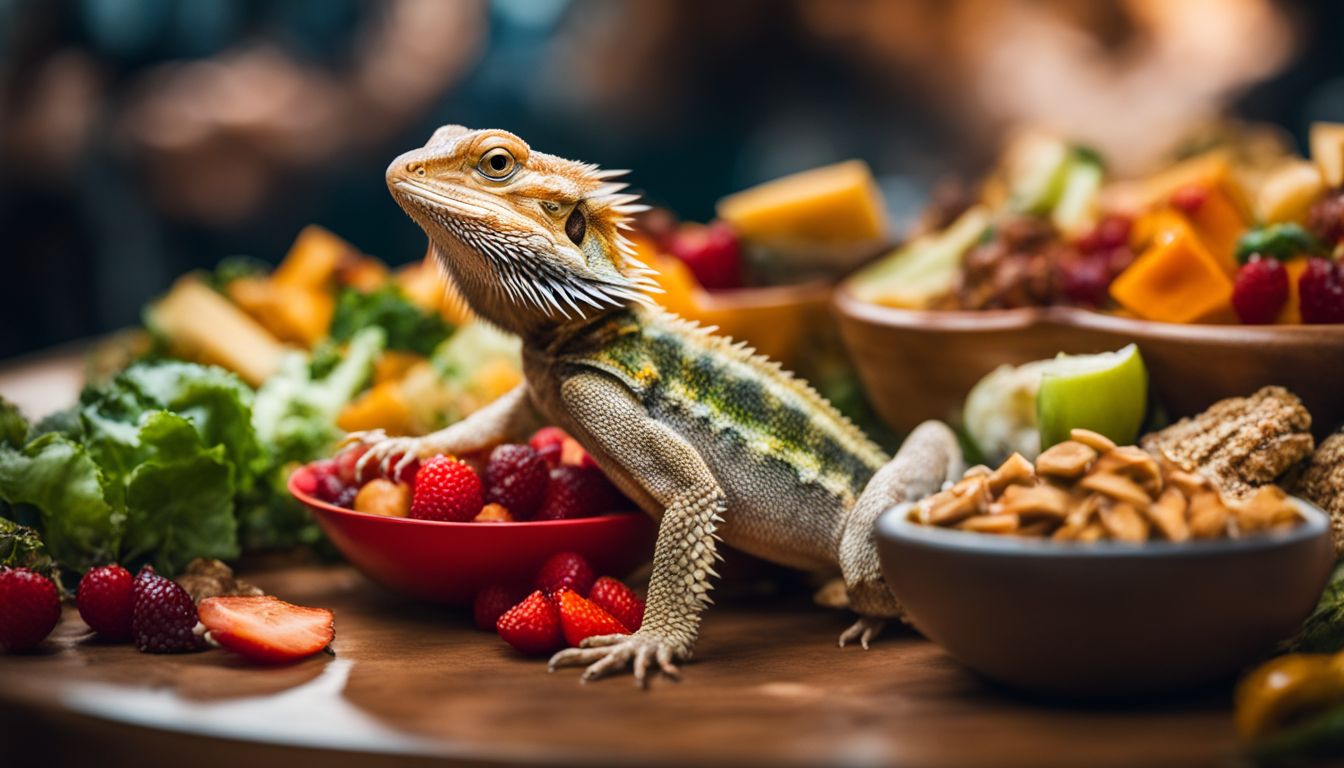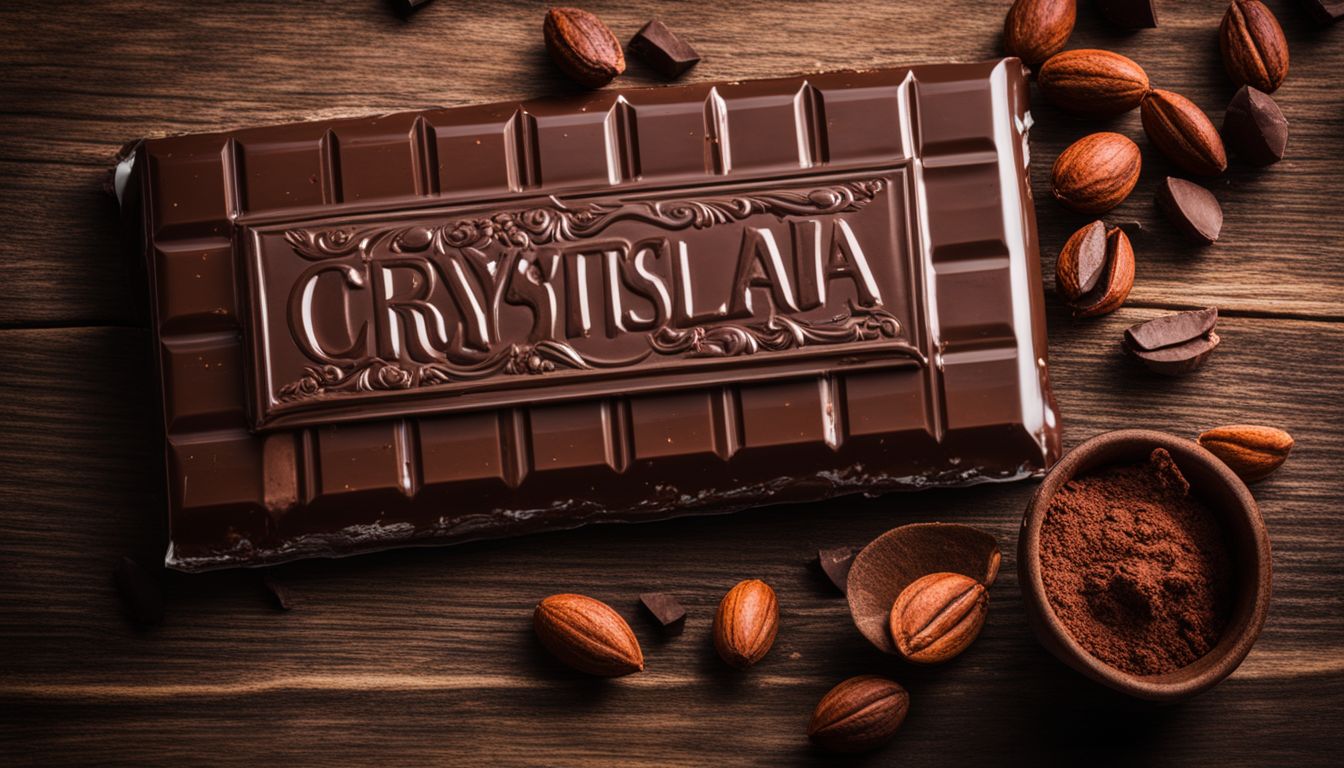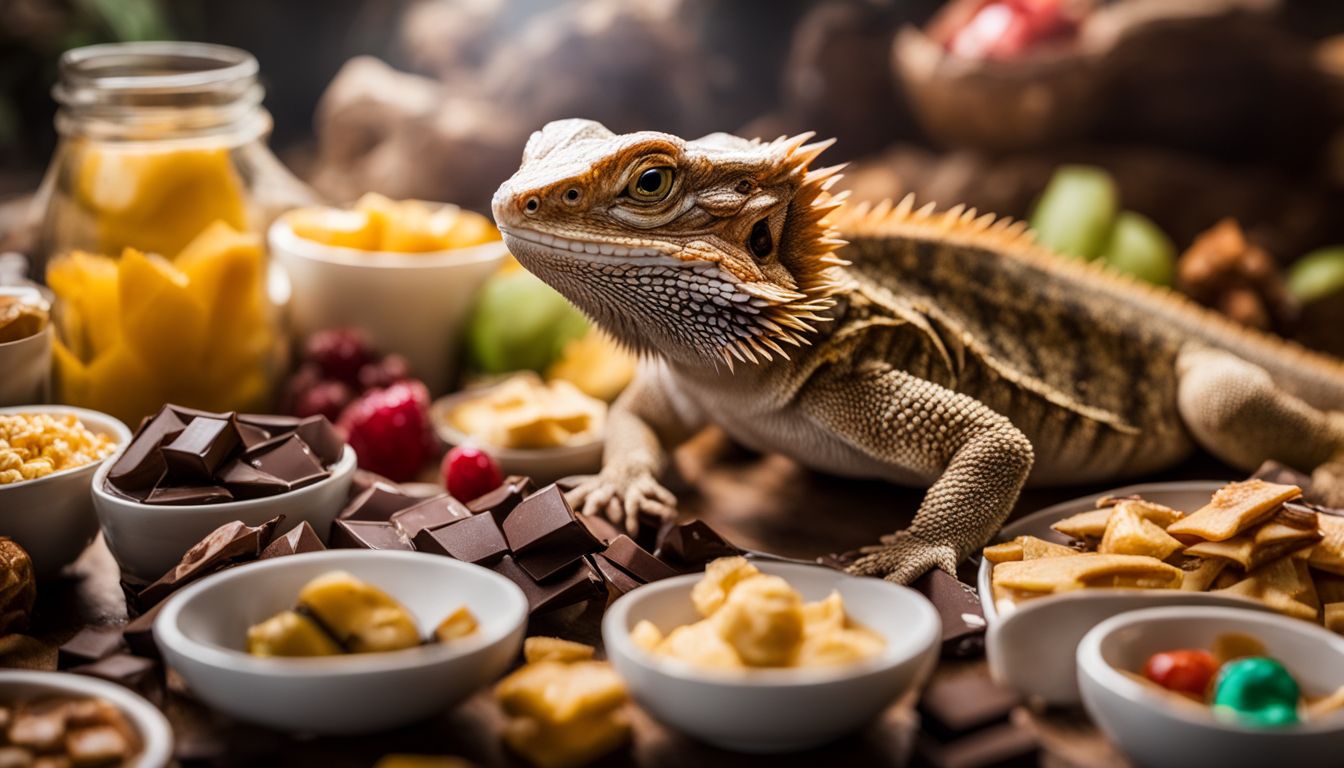Are you wondering if it’s safe to share a piece of your chocolate treat with your bearded dragon? It’s crucial to know that chocolate is toxic to these reptiles. Our blog will guide you through the reasons why chocolate and other certain foods are off-limits for your scaly friend.
Stay informed and keep reading.
Can Bearded Dragons Eat Chocolate?

Bearded dragons must never eat chocolate. It contains theobromine, a substance toxic to reptiles, including your scaly friend. Even small amounts can lead to health issues, proving chocolate is an unsuitable treat for them.
This high-fat, processed food brings more harm than good, intensifying the risk of serious problems in these pets.
Moving on from why chocolate is a bad idea, let’s dive into what makes it nutritionally poor for bearded dragons and how it affects their diet negatively.
Nutritional Facts of Chocolate

Chocolate contains high levels of energy, sugar, and fat.. It also has varying amounts of protein and small quantities of vitamin A.
Energy
Chocolate packs a punch with 540 kcal per 100g, making it a high-energy food. This much energy is far from ideal for bearded dragons’ diet. These little creatures need foods that match their nutritional needs without overloading them with calories.
Considering the nutrient content, chocolate’s high calorie content isn’t just unnecessary; it’s unsuitable. Foods like this can cause health issues in bearded dragons due to their specific dietary restrictions.
It’s crucial to stick to safer, lower-energy options for these pets’ overall well-being and avoid dangerous foods that could harm them.
Protein
Protein plays a crucial role in the diet of bearded dragons, much more than vitamins. These reptiles need a good amount of protein for their muscle development and overall health. Chocolate, however, lacks the appropriate type or level of protein that bearded dragons require.
It’s not just about filling them up; it’s about providing the right nutrition to meet their specific needs.
Next comes sugar content in chocolate and why it’s harmful to bearded dragons..
Sugar
Sugar is a type of sweetness found in many confectionary items, such as candy and desserts. It contains high calories and is unhealthy for bearded dragons due to its high fat content.
Excessive sugar from chocolate can lead to health risks for these reptiles, making it important to avoid feeding them anything with sugar, including chocolate.
Fat
Chocolate has a high fat content, which can lead to weight gain and health issues for bearded dragons. Reptiles should avoid foods with high fat levels like chocolate as it is not suitable for their diet.
Vitamin A
Vitamin A is essential for bearded dragons to stay healthy. However, too much vitamin A can be harmful to them. It’s crucial to ensure they get the right balance of nutrients, including vitamin A, in their diet.
Imbalances can lead to deficiencies which can negatively impact their health.
The high amount of vitamin A in chocolate makes it unhealthy for bearded dragons. This is why it’s important for bearded dragon owners to carefully consider what foods they feed their pets, ensuring that they provide a well-balanced and safe diet.
Calcium and Phosphorus Ratio
The calcium to phosphorus ratio is crucial for a bearded dragon’s health, with the ideal ratio being 2:1 in favor of calcium. This balance supports their bone development and overall well-being.
If this ratio is disrupted, it can lead to issues with calcium metabolism and vitamin D absorption, affecting the reptile’s health negatively.
Ensuring that your bearded dragon’s diet consists of foods with an appropriate calcium to phosphorus ratio is essential for promoting healthy bone development and maintaining their overall vitality.
Now let’s delve into why chocolate should not be part of a bearded dragon’s diet.
Caffeine
Caffeine is found in chocolate and can be harmful to bearded dragons. It can lead to vomiting, diarrhea, and an increased heart rate if they consume it. Be cautious as the caffeine content in chocolate makes it unsafe for your pet bearded dragon to eat.
Let’s explore another aspect of a bearded dragon’s diet – “Nutritional Facts of Chocolate”.
Why Bearded Dragons Can’t Eat Chocolate
Bearded dragons can’t eat chocolate due to its high fat and sugar content, which can be harmful to their health. Additionally, theobromine and caffeine in chocolate are toxic to bearded dragons and can lead to serious health issues.
High Fat and Sugar Content
Chocolate has a high fat and sugar content, making it unsuitable for bearded dragons. The fat in chocolate can be hard for them to digest, while the high sugar content can negatively impact their health.
These factors make chocolate harmful to the digestive system of bearded dragons.
Theobromine and caffeine present in chocolate can also be toxic to these reptiles. Consuming foods with theobromine and caffeine has adverse effects on their well-being. Thus, it’s crucial to avoid feeding any chocolate or similar products to your pet bearded dragon.
Phosphorus and Calcium Imbalance
The calcium to phosphorus ratio is crucial for the health of bearded dragons. When their diet contains too much phosphorus and not enough calcium, it can lead to a deficiency in calcium, causing potential health problems.
This imbalance may show up in blood tests with higher levels of phosphorus than calcium, or as low levels of calcium overall. Maintaining the right balance is essential for preventing metabolic bone disease in bearded dragons.
High levels of phosphorus found in chocolate can disrupt this delicate balance..
Theobromine and Caffeine Toxicity
The high fat and sugar content in chocolate poses a danger for bearded dragons, but the real threat lies in theobromine and caffeine. These compounds can cause vomiting, hyperactivity, diarrhea, seizures, and dangerously high heart rate.
Even a small amount of chocolate can potentially be lethal due to the toxicity of these substances. Bearded dragon owners need to be aware of these dangers and avoid feeding their pets any products containing theobromine or caffeine.
Food to Avoid Feeding Bearded Dragons
Bearded dragons should not be fed chocolate, as it is harmful to their health. Here are foods to avoid feeding bearded dragons:
- Chocolate contains high amounts of fat and sugar, which are not suitable for bearded dragons’ diets.
- Dairy products, including chocolate, can cause digestive issues and should be avoided.
- Processed foods like chocolate can lead to obesity and other health problems in bearded dragons.
- Human foods with high – fat content, such as chocolate, do not provide the necessary nutrients for a bearded dragon’s diet.
Safe Food Alternatives for Bearded Dragons
Bearded dragons can enjoy a variety of safe and nutritious foods such as leafy greens, bell peppers, squash, blueberries, and insects. To discover more vet-approved food options for your bearded dragon’s health and happiness, dive into the full blog!
Can Bearded Dragons Eat Coconut??
Bearded dragons can indeed eat coconut in moderation. Coconuts offer essential nutrients like healthy fats, protein, and fiber, along with valuable vitamins and minerals such as iron, zinc, and magnesium that support their nutritional requirements.
However, it’s crucial to seek veterinary advice before considering feeding coconut oil to your bearded dragon for potential bowel movement benefits. By incorporating a varied diet including safe food alternatives like coconut within recommended limits, you can ensure your reptile’s digestive health and overall well-being.
Remember to enhance their vitamin and mineral intake while providing the right amount of healthy fats for a balanced reptile diet rich in essential nutrients.
Conclusion
In conclusion, chocolate is a big no for bearded dragons. It contains high fat and sugar, along with toxic substances like theobromine and caffeine. Feeding them chocolate can lead to serious health issues.
Stick to their safe diet to keep these reptiles healthy and happy!
Discover more about suitable diets for your pet by exploring whether bearded dragons can eat coconut.
FAQs
1. Can bearded dragons eat chocolate?
No, chocolate is toxic to bearded dragons and should never be fed to them.
2. What happens if a bearded dragon eats chocolate?
Eating chocolate can lead to serious health issues for a bearded dragon, including vomiting, diarrhea, seizures, and even death.
3. Are there any types of chocolate that are safe for bearded dragons?
No, all forms of chocolate, including white and dark varieties, are harmful to bearded dragons.
4. Can a small amount of chocolate harm a bearded dragon?
Yes, even a small amount of chocolate can have detrimental effects on the health of a bearded dragon.
5. What should I do if my bearded dragon accidentally consumes chocolate?
If your pet ingests any amount of chocolate, seek immediate veterinary assistance as it poses a severe risk to their well-being.




